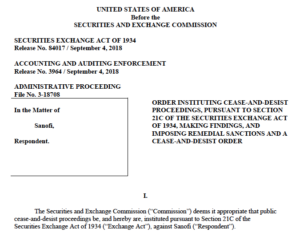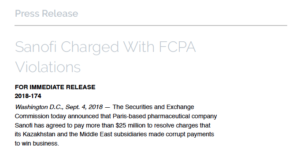Types Of SEC Cases: Illegal Foreign Kickbacks
The SEC fined pharmaceutical company Sanofi over $25 million for paying illegal foreign kickbacks to government officials in Kazakhstan, Levant, and the Gulf.How Sanofi’s Foreign Kickbacks Worked
As explained in the SEC’s Order imposing the sanctions, employees and agents of certain Sanofi subsidiaries paid the illegal foreign kickbacks to improperly influence officials of Kazakhstan, and countries in the Levant and Gulf regions, and to increase sales of Sanofi’s pharmaceutical products. The Order stated that Sanofi generated the funds that it used to pay the illegal foreign kickbacks by creating fake expenses for: (1) travel and entertainment; (2) product samples; (3) clinical trial and consulting fees; (4) round table meetings; (5) distributor discounts; and (6) credit notes to distributors. These fake expenses were falsely recorded as legitimate on Sanofi’s books and records.
The SEC Order
Sanofi’s Foreign Kickbacks Violated the FCPA
The SEC found that Sanofi failed to create and maintain sufficient internal accounting controls to make sure that it recorded its expenses properly. It also found that Sanofi did not maintain an effective anti-corruption compliance program in connection with Kazakhstan, Levant, and the Gulf. Thus, Sanofi’s illegal foreign kickbacks and its deficient books and records violated the Foreign Corrupt Practices Act (“FCPA”). The Chief of the SEC’s FCPA Unit remarked in a press release:Bribery in connection with pharmaceutical sales remains as a significant problem despite numerous prior enforcement actions involving the industry and life sciences more generally.

The SEC’s press release
Whistleblowers Can Report Illegal Foreign Kickbacks To The SEC
This case illustrates some types of misconduct that could give rise to SEC whistleblower cases if reported to the Commission through the SEC whistleblower program. However, the SEC has not made any public statement as to whether this case was itself an actual SEC whistleblower case. The SEC Office of the Whistleblower posts Notices of Covered Action (“NoCA”) for Commission actions where a final judgment or order results in monetary sanctions exceeding $1 million. The NoCA list does not disclose if a particular Enforcement action was brought as the result of an SEC whistleblower case, tip, complaint, or referral being filed with the Commission.Additional Information
For additional information about illegal foreign kickbacks and FCPA violations, click on the links below:- The SEC’s Order in the Sanofi case. (External link to the SEC’s website.)
- The SEC’s Press Release about the Sanofi case. (External link to the SEC’s website.)







